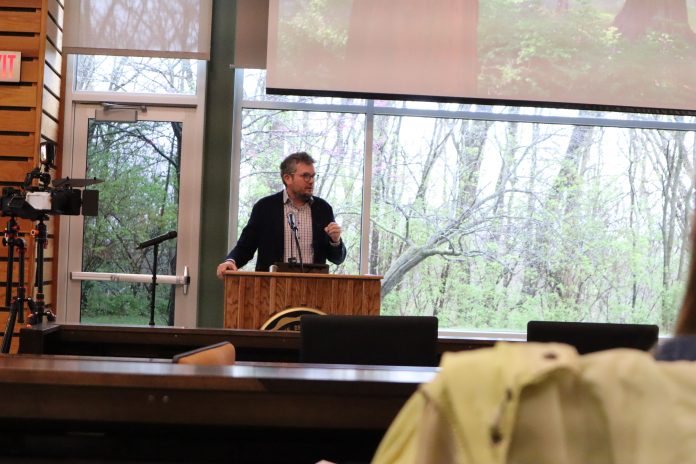
At the Prindle Institute for Ethics on Saturday, April 5, students and faculty escaped the rainy morning to listen to several speakers talk at the Global Health Symposium sponsored by the Tumaini Foundation. Leaders on pressing Global Health issues provided an opportunity for all in attendance to learn.
The event hosted a variety of speakers, including Associate Professor of Biology Chris Hall from Berry University’s talk on the “One Health” approach—a concept that no population exists independent from another or from the environment they share, requiring we understand all the populations and the environment in which they live.
American author, YouTuber and philanthropist John Green also came to talk about his new book released in March 2025, ”Everything Is Tuberculosis: The History and Persistence of Our Deadliest Infection.”
John Green, Partners in Health (PIH) Board Member, began his talk with his original focus on maternal health and Sierra Leone. For generations, the country has struggled with providing safe maternal healthcare. In 2017, 1-in-17 women could expect to die in pregnancy or childbirth in Sierra Leone. Green talked about how ministries of health have helped reduce maternal mortality by 70% since then.
In March 2019, Green visited several clinics in Sierra Leone in a profoundly impoverished community. During the last day, Green visited a tuberculosis hospital. Although reluctant to, Green said it changed his life.
When Green tiredly walked in, a child named Henry, the same name as his son, physically grabbed him by the shirt and walked him around the hospital. They spoke in-depth about the hospital, travelling to the laboratory to look at a tuberculosis sample. They then went to the wards to see patients with tuberculosis.
“I have never seen people this sick before. I was shocked by it,” Green said.
Called the robber of youth, tuberculosis often killed people at a young age throughout human history. Being around since before humans, the mycobacterium impacts the lungs, where the body’s immune system can surround it to form tubercles.
Although curable, tuberculosis often takes four to six months of antibiotics to treat and sometimes much longer. It would come to Green’s knowledge that Henry was on the last available regiment of antibiotics.
“I think of tuberculosis and our response to it as a staircase. At the top of the staircase, we eliminate tuberculosis. We know we can get to the top of the staircase. For the vast majority of human history, we are at the bottom stair.”
While racializing the disease has caused steps down, some understanding of the disease has helped us step up. Identifying it as infectious and as a bacteria helped lower the rates of tuberculosis. Vaccine development, lung deflation, antibiotics and wide-spread screening has helped to reign in the tuberculosis problem to where society is today. However, Henry’s story tells a tale that the problem is far from over and that we are falling down the stairs again.
“The real cause of tuberculosis is human-built systems in the 21st century. We are the cause but that also means we are the solution,” Green said.
When tuberculosis ceased to be a problem in the United States, pharmaceutical companies lost the incentive to continue tuberculosis research. Since then, the bacterium has had the chance to become resistant to those old drugs, which is especially a problem in places such as Sierra Leone where those drugs are ineffective.
“This is not the end of the story, this is the middle of the story,” Green said.
Green said that to end the story of tuberculosis, almost 25 billion dollars are needed. Almost certainly, Green mentioned, that will have to be a sacrifice from the rich world. Although it would be hard to eradicate, we could eliminate it as a public health crisis.
Henry was able to receive personalized antibiotic care and cure his tuberculosis. Although he spent several years away from school, Henry was able to finish high school and enroll at the University of Sierra Leone, where he is now a junior. Green hopes that in the future everyone who lives with tuberculosis will receive the care that Henry did.
Professor of Sociology Bernice Pescosolido from Indiana University focused her talk on “Stigma and Global Mental Health.” Also at the symposium, Dr. Anatole Manzi from Harvard Medical School and Partners in Health discussed “Reimagining Global Health - A Call for Collective Optimism.”
